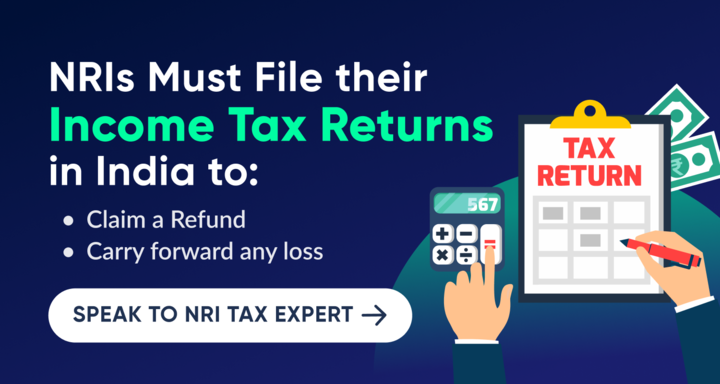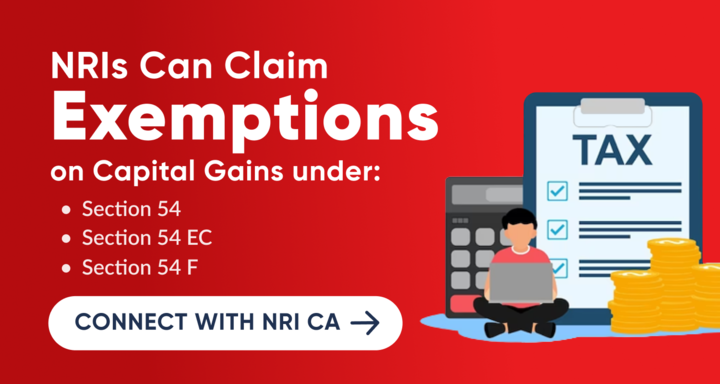As a Non-Resident Indian (NRI), there are several special provisions available to you under the Income Tax Act, 1961. These provisions can be found in sections 115C to 115-I of the Act. These are designed to provide you with various tax benefits and exemptions. In this blog, we will take a look at the special provisions claimed by NRIs under Section 115C to Section 115I.

Who Can Claim the Benefit of Special Provisions Under Section 115C to 115-I?
Non-Resident Indians are eligible to avail the advantages of the special provisions. The term Non-Resident Indians encompasses two categories:
- Indian citizens who reside outside India
- Individuals of Indian origin who reside outside India
Individuals will be considered of Indian origin if-
- they, their parents, or any of their grandparents were born in undivided India.
What are the Incomes that are Qualified For Special Treatment in case of NRI Under Section 115C to 115-I?
Sections 115C to 115I of the IT Act are limited to certain types of income earned by NRIs. These include:
- Investment income received from “foreign exchange assets” that are not dividends as covered by Section 115-O.
- Long-term capital gains received from the sale or transfer of “foreign exchange assets”.

What are Foreign Exchange Assets?
“Foreign exchange assets” refer to “Specified Assets” that have been acquired or purchased by the assessee using convertible foreign exchange. The following are considered as “Specified Assets” for this purpose:
- Shares in an Indian company, whether public or private.
- Debentures issued by an Indian company that is not a private company.
- Deposits made with an Indian company that is not a private company. For example, deposits made with Indian banks, public limited companies, etc.
- Securities issued by the Central Government
- Any other assets that the Central Government may specify through notification in the Official Gazette.
Section 115D: How to Calculate Investment Income of NRI?
When calculating the investment income of a Non-Resident Indian (NRI), no deductions for expenses or allowances can be claimed under any provision of the Income Tax Act. Additionally, no deductions under Sections 80C to 80U can be claimed for investment income earned by NRIs.
How To Calculate Long-Term Capital Gain of NRI?
The computation of long-term capital gains resulting from the sale or transfer of foreign exchange assets must adhere to the following conditions:
- The benefit of indexation under the second proviso to Section 48 cannot be availed of in case of sale or transfer of foreign exchange assets.
- No deduction is allowed for long-term capital gains under Sections 80C to 80U.
- By investing sale consideration in another asset, they can claim an exemption under Section 115F.
Section 115E: Tax On Investment Income And Long-Term Capital Gain
Investment income and long-term capital gains of NRIs are subject to a tax rate of 20% and 10%, respectively. Long term capital gain which arises on transfer of bonus shares (in case bonus shares were allotted to NRI on his original investments made out of convertible foreign exchange) is eligible for the aforesaid 10 % Tax Rate.
Section 115F
This section provides an exemption from tax on long-term capital gains arising from the transfer of foreign exchange assets. The provision applies when the assessee invests the net consideration (or a portion thereof) in specified assets or savings certificates referred to in section 10(4B) of the Income Tax Act within six months of the transfer.

Section 115G: Return Of Income not to be Filed in Certain Cases by NRI
If a Non-Resident Indian (NRI):
- has income from a Foreign Exchange Asset, or Long-Term Capital Gains arising from the transfer of a Foreign Exchange Asset, or both,
- and the tax deductible at the source from such income has already been deducted,
- they are not obligated to file a return of income under Section 139(1).
The income earned from foreign exchange assets and long-term capital gains resulting from the transfer of such assets would be treated as a distinct block and charged to tax at a flat rate as described above. However, if the NRI has additional income in India, such income will be treated as a separate block and taxed in accordance with other provisions of the Income Tax Act.
Section 115H: Benefit Available even after the NRI Assessee becomes Resident
If an NRI in any previous year becomes assessable as a resident in India in any subsequent year, he/she may provide:
- a written declaration to the Assessing Officer (AO) and
- their return of income under section 139 for the assessment year for which they are assessable
- The declaration will state that the special provisions will continue to apply to them in relation to the investment income derived from any foreign exchange asset.
- which includes debentures of and deposits with an Indian public limited company and Central Government securities.
If the NRI makes such a declaration, the special provisions will continue to apply to them in relation to such income for that assessment year (and for every subsequent assessment year) until the transfer or conversion into money of such assets.
Furthermore, as long as the original source of deposit was convertible foreign exchange, transferring such a deposit from one bank to another bank would not affect its identity as a “foreign exchange asset.” As a result, the assessee is entitled to the concessional rate of tax on interest earned from such deposits.
Section 115I: Special Provisions Won’t Apply If The NRI-Assessee So Chooses
A Non-Resident Indian (NRI) has the option to not apply the special provisions related to the taxation of investment income and long-term capital gains at a flat rate. To exercise this option, the taxpayer must make a declaration in their income tax return for the relevant assessment year. If an NRI chooses this option, their total income, including income from foreign exchange assets and long-term capital gains arising from the transfer of a foreign exchange asset, will be charged to tax under the general provisions of the Income-tax Act.

Contact SBNRI
There are various ways for NRIs to save income tax in India, but due to a complicated tax system and recurrent amendments, understanding tax laws can be confusing, especially for NRIs. NRIs may miss claiming deductions and other benefits. At SBNRI, we understand this struggle. You can download SBNRI App to connect with our NRI Tax Experts to know more about new TRC, TDS/ TCS rules for NRIs. You will also get end-to-end assistance related to NRI tax filing.
SBNRI will also help you get a lower TDS Certificate to reduce tax payable. You can also click on the button below to ask any questions. Visit our blog and YouTube Channel for more details.



